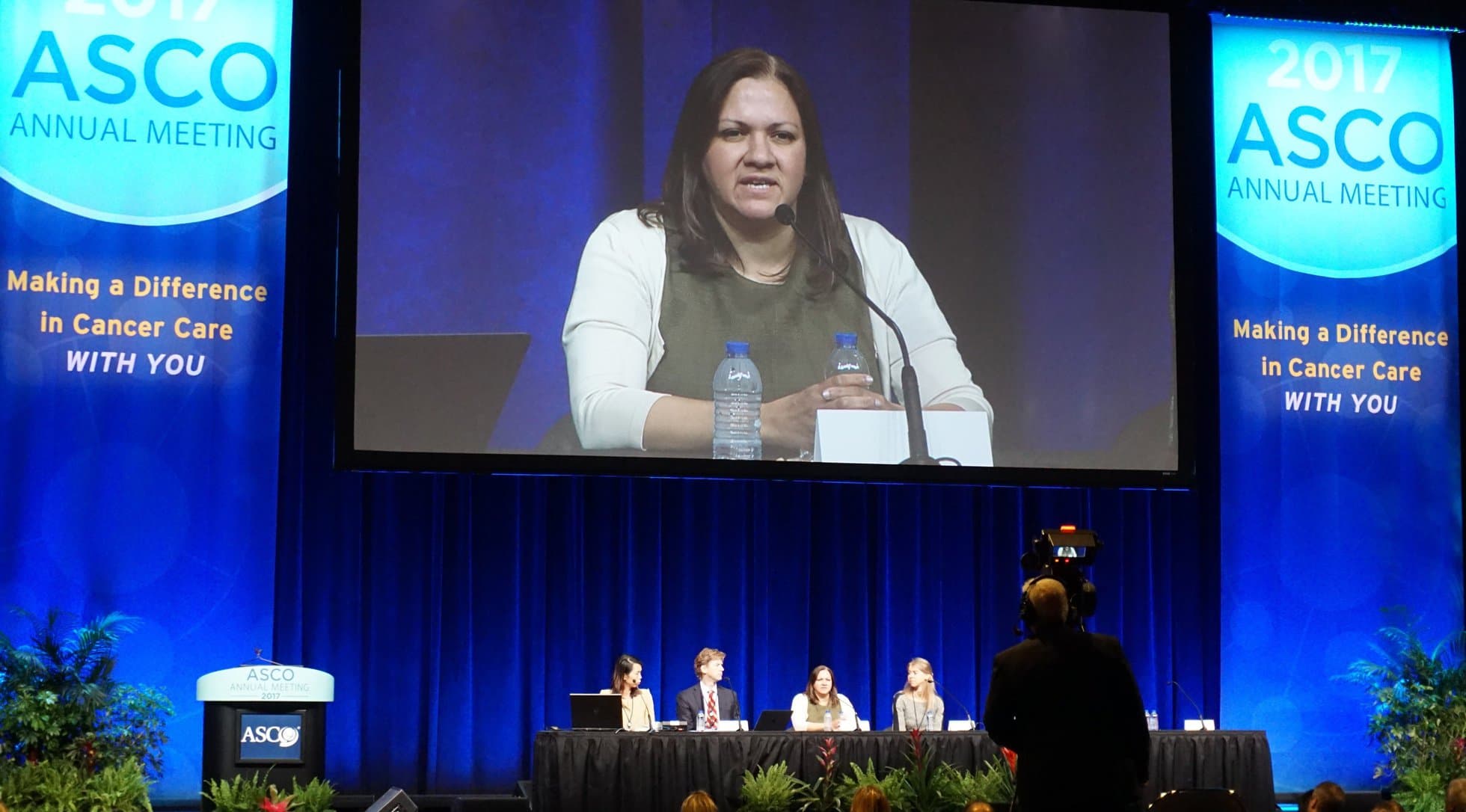Immunotherapy drug effective in triple-negative breast cancer

Rita Nanda, MD, associate professor of medicine at the University of Chicago, presenting data from the I-SPY 2 trial.
In the I-SPY 2 clinical trial, adding the checkpoint blocker pembrolizumab (KeytrudaTM) to standard therapy dramatically improved response rates for patients with invasive triple-negative breast cancer (TNBC), tumors that lack estrogen and progesterone receptors as well as HER2.
Sixty percent of the women with TNBC who received pembrolizumab in addition to standard therapy had a pathological complete response no evidence of cancer in the breast or lymph nodes compared to 20 percent of the women who received standard chemotherapy alone.
For women with hormone-receptor positive, HER2 negative disease, the complete response rate for patients who received associate standard therapy plus pembrolizumab nearly tripled, from 13 percent to 34 percent.
"The results observed in this trial are not only encouraging, but game changing, and set the stage for a shift in the treatment of many of these breast cancer subtypes toward combinations that can make a difference in patient outcomes," said medical oncologist Rita Nanda, MD, associate professor of medicine at the University of Chicago, who presented the data at the 2017 annual meeting of the American Society of Clinical Oncology in Chicago.
I-SPY 2, a phase-2 clinical trial, incorporates several innovative features designed to decrease the time, cost, and number of patients required to bring new drug therapies to breast cancer patients. Sponsored by QuantumLeap Healthcare Collaborative, I-SPY 2 is an adaptively-randomized, phase II multi-center trial for women with newly diagnosed, locally advanced breast cancer (Stage II/III). It is designed to screen promising new treatments and identify effective therapies for specific patient subgroups based on the molecular characteristics of their disease.
The trial uses an adaptive study design assessing the combination of biologically targeted investigational drugs with standard chemotherapy. The goal is to determine which therapies increase the probability of a complete response in the breast and the lymph nodes at the time of surgery. The data presented from the I-SPY 2 TRIAL today were based on results from patients at high risk of relapse.
The purpose of this study is to learn which new drug agents are most effective with which types of breast cancer tumors and to use each patient's tumor profile to assign targeted therapies best suited to her tumor biology.
"Not all breast cancers are the same," said Nanda. "Over the years, there has continued to be a significant gap in the treatment options available for patients with certain subtypes, such as triple-negative breast cancer."
The regimen presented today "indicates a new and important treatment pathway and gives us well-grounded hope for new options for patients with these aggressive breast cancers and that's potentially very good news," said Laura J. Esserman, MD, MBA, professor of surgery and radiology at the University of California at San Francisco and the overall principal investigator for the I-SPY trials.
Pembrolizumab works by increasing the ability of the body's immune system to help detect and fight tumor cells. KEYTRUDA is a humanized monoclonal antibody that blocks the interaction between PD-1 and its ligands, PD-L1 and PD-L2, thereby activating T lymphocytes which may affect both tumor cells and healthy cells.
It has been approved for use in treatment of melanoma, lung cancer, head and neck cancer, Hodgkin lymphoma, urothelial carcinoma and others. It can cause immune-mediated side effects such as pneumonitis, colitis, liver disease, hypophysitis, thyroid disorders, diabetes and nephritis.
Additional I-SPY 2 TRIAL investigators include Minetta C. Liu, Douglas Yee, Angela M. DeMichele, Christina Yau, Smita M. Asare, Nola M. Hylton, Laura J. van't Veer, Jane Perlmutter, Anne M. Wallace, A. Jo Chien, Andres Forero-Torres, Erin D. Ellis, Heather S. Han, Amy S. Clark, Kathy S. Albain, Judy C. Boughey, Anthony D. Elias, Claudine Isaacs, Kathleen Kemmer, Hope S. Rugo, Michelle Melisko, Fraser Symmans and Donald A. Berry.

Breast Cancer Care
Our team represents expertise across the spectrum of breast cancer care: breast imaging, breast surgery, medical and radiation oncology, plastic and reconstructive surgery, lymphedema treatment, clinical genetics, pathology and nursing. Our comprehensive care approach optimizes chances of survival and quality of life.
Learn more about UChicago Medicine breast cancer care.
Rita Nanda, MD
Rita Nanda, MD, specializes in the treatment of breast cancer. She has particular expertise in the treatment of triple-negative, early onset, hereditary, and locally advanced breast cancers.
Read Dr. Nanda's profile
